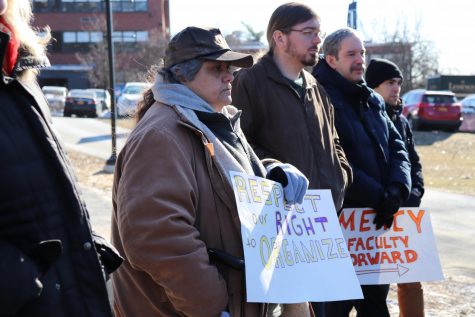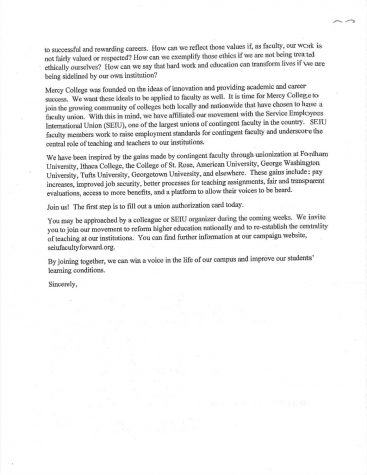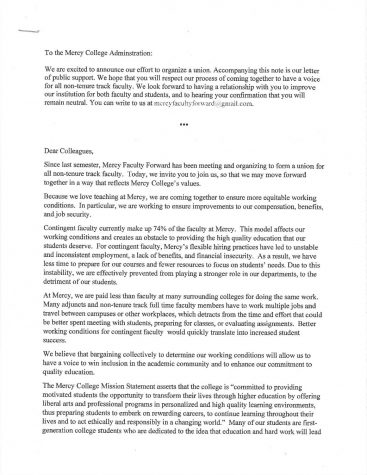Mercy College Adjuncts Announce Intention to Unionize
The adjunct professors of Mercy College have formally announced their decision to unionize following a gathering on Jan. 31 in front of Verrazano Hall in hope to receive what they consider “better working conditions.”
Over 20 faculty members came to show solidarity toward this movement in the brutal and freezing coldness of winter, including staff from Fordham University, who in the fall of 2017, overwhelmingly voted to support the unionization of part-time faculty.
In a letter featuring the signature of 91 different Mercy adjunct faculty members, the group, known as “MercyFacultyForward,” formally announced that they would look to work collectively in forming a union.
MercyFacultyForward is affiliated with the Service Employees International Union. The SEIU represents nearly two million workers throughout North America.

Unlike a full-time worker, an adjunct professor is paid on a per course basis and does not have medical benefits. An adjunct is also not fully employed with any one specific institution.
In order to work as an adjunct at Mercy, one needs to have a Master’s Degree (unless they’re given special permission in other circumstances.)
The average adjunct makes $2,200. Many numbers have been offered for an hourly rate. Considering a course meets for three hours weekly for 15 weeks, time spent on course preparation and marking assignments varies.
This rate can be increased if one works at the college or holds a certain degree.
With anywhere from 100 to 150 assigned adjunct professors, they contribute to the near 75 percent of part-time faculty for the college. It emphasizes these points on the letter that was eventually given to President Tim Hall.
“We believe that bargaining collectively to determine our working conditions will allow us to have a voice to win inclusion in the academic community and to enhance our commitment to quality education,” stated in the letter.
Citing the successes of colleges like Fordham University, Ithaca College, George Washington University, and others, the group hopes to gain benefits such as increased pay, better job security, and an overall greater platform to express their views to the college.
The day began with songs, signs, and speeches and high moral. A delegate was eventually able to meet with Hall to announce that the process to unionize was beginning. Despite this, he remained hesitant toward the news when English adjunct, Caroline Curvan, came out to address the group.
“We had a very productive conversation with President Hall, we gave him our letter, we told him why we were doing this and he seemed to feel that a union may not be the best way for us to get our point across. He felt that where he’s from in the South, he would speak to the state directly rather than with the union. He finds that in the north that what we tend to have here is that he’s only able to speak with a few representatives, so that seems to be the thrust of his main concern.”

According to Curvan, Hall has claimed that adjuncts have seen a raise every year but one since he’s taken over as President of Mercy College in May 2014. That year was not specified.
Despite this, Mercy College adjuncts reportedly make some of the lowest rates of any part-time professors within the New York City Metropolitan area, with numbers ranging to only $2,100 per course, according to the Service Employees International Union.
According to Mercy College’s official website, adjuncts are offered minimal benefits. “Adjunct faculty are eligible for tuition remission towards matriculated graduate programs at 50 percent of the cost per semester. Approved tuition remission will be taxable as income to the recipient. All application policies and procedures apply.” They may also audit courses at no cost to them with the approval of the respective school dean.
Additionally, adjuncts are eligible for coverage under the New York State Short Term Disability immediately upon hire. Adjuncts are allowed to take advantage of Theater Tickets (Plum Benefits), Westchester Broadway Theater – (914) 592-2268, Fitness Memberships to Globalfit gyms, Bronx Zoo – (718) 741-1432, Verizon Phones (www.vzw.com/getdiscount), Dell Computers, Hewlett Packard Computers, and Travel/Shopping. They can also enroll in the college’s retirement (403B) program. Payroll deductions may be remitted to either of the carriers.
The fight for better working conditions hasn’t only been cited as beneficial to the workers, but also to the students, according to Kevin Donahue, an adjunct Math professor.
He stated that due to the constant hiring (and subsequent firing) of adjuncts, students were being given the short stick when it comes to a quality education.
“This is terrible for the students because this means that 75 percent of their classes are being taught be somebody who isn’t a good teacher, and those of us who care about teaching and want to help our students need a living wage to actually do that.”
In a letter from Thomas J. Abinanti, the Assemblyman for New York’s 92nd District, which includes Central Westchester, he declared his support for the ongoing fight.
“It appears that contingent faculty are the clear majority of Mercy’s total teaching faculty. And now the number of contingent positions at Mercy has increased over the years. I understand that while tuition for students has risen, the pay for contingent faculty at Mercy has remained more or less stagnant.”
Citing that these professors offer the most in terms of day-to-day in the molding of Mercy students, Abinanti praised and offered support to the ongoing process.
Catherine Johnson, an English adjunct who has been at Mercy for about 10 years, complained about the pay, claiming for it to be insufficient to live. She also mentioned a story of an adjunct who hasn’t received a pay raise in their 20 years at the college.
But more importantly, the need for a voice was crucial for her.
“I would like some more say on my professional life.”
For adjuncts like Terri Lucas, a union means more than one may initially imagine.
Using the recent Federal Shutdown as an example, Lucas emphasized that a “gig economy” has done nothing but hurt the labor force, which only makes unionizing that much more important.
“If I was not married to someone very kind and had a more stable position, I would be homeless, again. I have had housing insecurity, food insecurity, and no health insurance in all of the time I’ve been an adjunct teaching because I can not earn enough money. I love teaching, (and) I think my students will tell you that I’m a good teacher. I love to teach and I wish I could make a living out of it.”
With the next meeting set for Feb. 12, a lot of progress needs to be made in order for the college and adjuncts to come to an agreement.


Nicole is from The Bronx and is a journalism major at Mercy College. Her hobbies include discovering new places to eat on a budget, photography, listening...

Steven Keehner was the Managing Editor of the greatest publication on the Hudson.
Hailing from the mediocre Town of Oyster Bay, New York, he enjoys...













